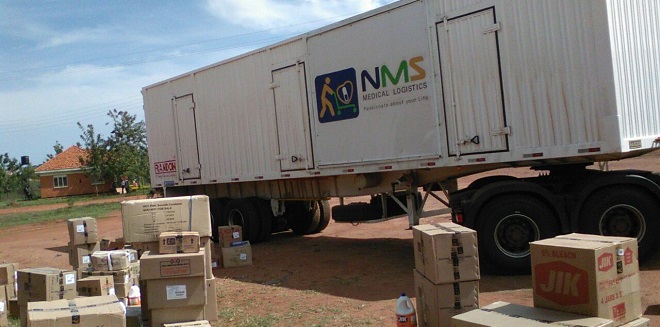
Kampala, Uganda | THE INDEPENDENT | Uganda parliament’s budget committee has started scrutinising a Sh41b additional funding request for the National Medical Stores (NMS) to meet a funding deficit for purchase of essential medicines and health supplies.
State minister for finance David Bahati has however faced some tough questioning by Members of Parliament on the budget committee for the supplementary.
“We want to know; are they reallocating this money or they are going to borrow afresh,” Muwanga Kivumbi, the Butambala county MP said when Bahati appeared last month.
Bahati told the committee that out of the Sh451.2b supplementary budget, Sh392.2b would be provided by the government through reallocations and domestic market borrowing. He added that Sh10b would be acquired through budgetary re-allocations, Sh27.6b external financing and Sh21.4b from appropriation in Aid (AIA). Bahati explained that the government had made reallocations in the Budget where Sh10b was realized and re-allocated.
The Sh41b is part of the Sh 451.2b supplementary budget schedule 1, for financial year 2017/18.The supplementary budget which is pending parliamentary approval and was tabled before the House recently, by the finance minister.
According to the ministry of finance, the Sh41b deficit for NMS arose from the depreciation of the exchange rate, which the ministry says affected the amount of essential medicines and health supplies that can be procured. With no corresponding increase in the budget for NMS, it necessitated a supplementary expenditure to meet the shortfall
In January this year, as part of its proposals to parliament, the Civil Society Organizations (CSOs) implored the government to commit more funds towards the National Medical Stores (NMS) to avoid drug stock outs in public health facilities.
Blood Bank needs support
According to a statement, the CSOs under their body, the Civil Society Budget Advocacy Group (CSBAG), also asked the government to consider improved funding for the Uganda Blood transfusion services to ensure steady supply and collection of blood.
Presenting their position paper on the health sector, regarding the FY 2018/19 national budget, to the Parliamentary committee on health, the CSOs noted that the budget for pharmaceuticals and other supplies had been significantly cut from UGX 762b in FY 2017/18, to UGX 515b in FY 2018/19.
“Although the NMS financing has increased to Sh 278b in 2018/19, this cut will be detrimental to the efforts to eliminate drug stock outs,” Nona Cynthia Tamale, a member of CSBAG, from Initiative for Social and Economic Rights (ISER), told the MPs.
The CSOs implored the government not to cut the budget for pharmaceuticals and other suppliers under Vote 014, but rather divert the money to Vote 116, to cover the NMS Funding Gap. “We reiterate that NMS and ministry of health should ensure that drugs are supplied to all health facilities in accordance to the needs of the people,” Ms Tamale said.
The CSOs urged the government, to consider a 50% budgetary increment towards blood transfusion services, in the FY 2018/19, and another 50% increment in the FY 2019/20. They noted that the Uganda Blood transfusion services was considering closure of four blood collection centers due to the significant reductions in budget arising from the ending of PEPFAR funding to UBTS. “This will reduce blood collection, to the tune of 43,200 units of blood annually,” Patrick Ojulong, a member of CSBAG said.
The Uganda Blood Transfusion service (UBTS) is the National Blood service responsible for all blood transfusion and safety activities for the entire country. In their position paper, the CSOs also raised concern about the reduction in funding for the primary health care program. Currently, in the FY 2017/18, primary health care was allocated Sh343.23bn, a slight increase from the Sh340.42bn allocation in the FY 2016/17.
According to the CSOs, the proposed budget for FY 2018/19 cuts the funding for the PHC program further by Sh3b. “This reduction, contradicts the ministry of health priority of preventative rather than cure strategy,” the CSOs noted in their position paper to parliament.
****
SOURCE: CSBAG newsletter
 The Independent Uganda: You get the Truth we Pay the Price
The Independent Uganda: You get the Truth we Pay the Price





